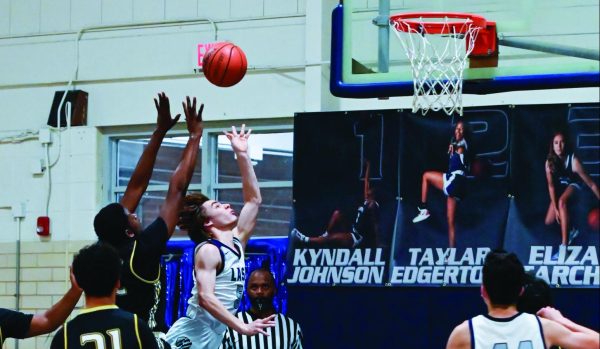Staying on the Sidelines: Sports Manager’s Role in School Athletics
March 28, 2022
While athletic managers are behind the scenes, they still remain an integral part of a team. The majority of athletic teams at LASA have multiple managers who help the team run smoothly, work that is often overshadowed by the accomplishments of the players on the team.
Sophomore Liesl Geiger is one of four managers on the girls’ soccer team. Geiger regularly attends practices with the girls’ soccer team to help assist and manage.
“I go to one or two practices a week, and I usually start with getting all the supplies like balls, nets, and goals and cones out to the field,” Geiger said. “If there’s anything that needs to be set up or moved during the middle of practice, I do that as well. I also catch balls and run around if there’s any extra help that needs to be done.”
The work of the student managers doesn’t go unnoticed by the players, according to junior Harriette Fraser, a player on the LASA girls’ soccer team. She believes having the managers makes a huge difference in the team’s productivity and how well their practices run.
“It’s really helpful and nice to have the managers there because they’ll be setting up the drills while we’re doing other things,” Fraser said. “We have more time to actually practice and everything just moves much smoother.”
Not all teams run the same way as the soccer team, though. The role of the team managers varies from team to team. While the soccer managers mostly attend practices, work with setting up, and make practices run smoother, the boy’s basketball managers do different work. Senior Journee Coleman is one of the basketball team’s two managers this year.
“During home games, we run the clock and do the book and keep score,” Coleman said. “We also do the music and the announcements and coordinate with the cheer team. We also go to every away game and do the book for every away game. We have their stats, we set up and tear down the gym too. We also help with transportation if we can’t get a bus in time.”
Students who manage teams found that there are many benefits to becoming a manager. Geiger manages the soccer team as a chance to spend time with friends on the team and earn the PE credit required to graduate.
“I have Ms. Cardinale for great ideas, and she talked me into it,” Geiger said. “I know a lot of people on the team, so I thought it would be fun to talk to them and connect to them. Also, it’s a good way to get PE credit.”
However, Coleman decided to become a manager for very different reasons than Geiger. Her decision to become a manager was more spontaneous and was made after she decided she wanted to spend more time with her friends.
“I didn’t think that I would have anything to do this spring semester so I thought it would be fun and I wanted to do something with Lana, the other manager, so we just decided to do it,” Coleman said.
Although they may not compete at games or train at practices, managers are still an integral part of the team. According to Coleman, it took some time for the players to warm up to the idea of managers and include them as a part of the team, but the managers now feel like an important part of the team.
“I do feel like I’m part of the team,” Coleman said. “It’s funny, because at first none of the boys on our team liked us at all and would ignore us. They thought it was weird that we were going to everything. Now, everyone is very good friends; we all go and eat together after games or before games, and when they lose we get disappointed too, and when they win we get happy for them.”










